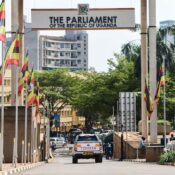
The President of Portugal Places Emphasis on Responsibility for Colonial Crimes and Transatlantic Slavery
Portugal’s president has emphasized the necessity of reparations in order to right historical wrongs and foster peace.
Marcelo Rebelo de Sousa, the president of Portugal, announced late on Tuesday that reparations were required because Portugal was accountable for atrocities during the colonial era and the transatlantic slave trade.
Last year, Rebelo de Sousa proposed that Portugal provide an apology for colonialism and transatlantic slavery, but he did not offer a detailed one.
He emphasized Portugal’s admission of historical wrongdoings during a Tuesday event for foreign correspondents, saying that the crimes committed—including colonial massacres—incurred high consequences. He emphasized the need of dealing with any deeds that went unpunished, people who got away with it, and property that was taken and never given back, saying that owning up to past wrongs was more important than just offering an apology.
“Saying sorry is the easy part,” he said, emphasizing the necessity of taking decisive action to redress past wrongs and open the door to genuine peacemaking.
“The costs must be covered by us. Exist any acts that went unpunished and for which the perpetrators were not detained? Are there any items that were taken and not given back? He said, “Let’s see how we can fix this.”
An estimated 12.5 million Africans were kidnapped, forced to travel great distances by European ships and traders, and sold into slavery over a period of more than four centuries. In the Americas, particularly in Brazil and the Caribbean, survivors worked long hours on plantations while others made large profits from their labors.
Portugal, a country that traded more Africans than any other European country—nearly 6 million—has not faced up to its historical responsibility for transatlantic slavery, with little teaching of the subject in educational institutions. Rather, the nation’s colonial past—which included control over regions like Angola, Mozambique, Brazil, Cape Verde, East Timor, and portions of India—is frequently idealized as a source of pride in the country.
There are growing proposals for the creation of a special tribunal to address the issue of transatlantic slavery and provide reparations and redress. Advocates underscore the significance of reparations and governmental measures targeted at redressing the disparities resulting from Portugal’s past, encompassing institutionalized racism.
All Categories
Recent Posts
Tags
+13162306000
zoneyetu@yahoo.com



